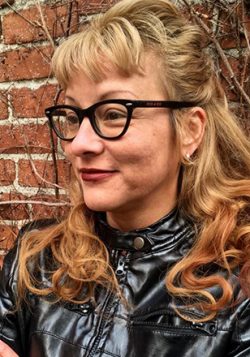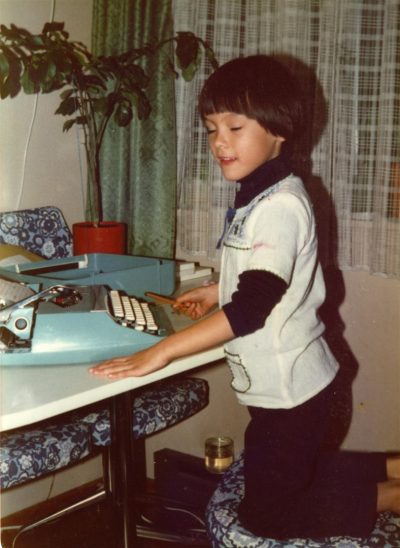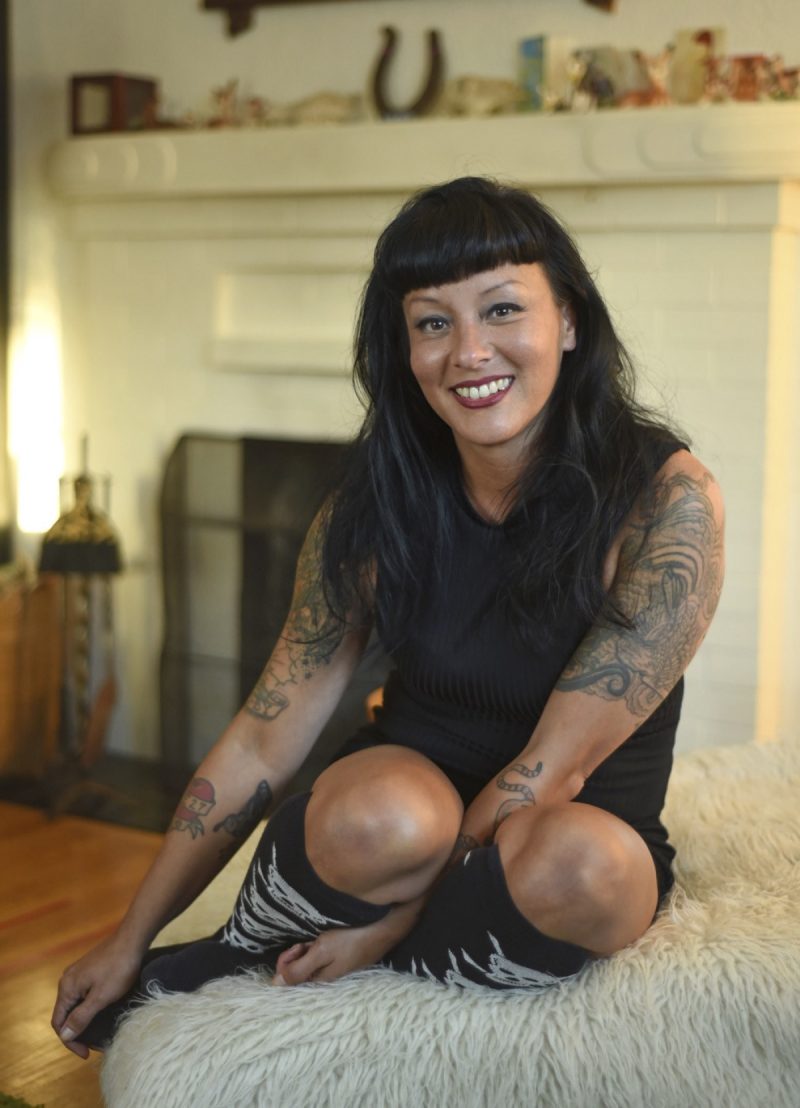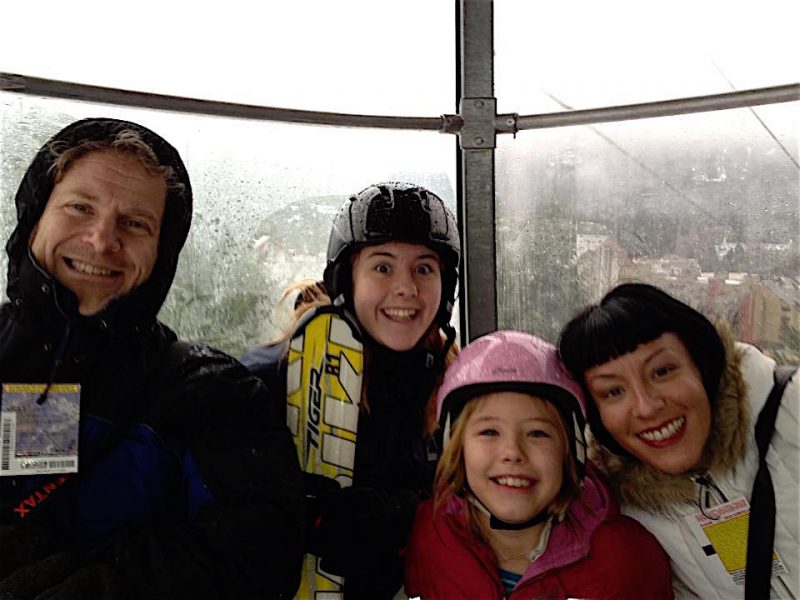#609 The pen is mightier than the street
September 05th, 2019

Mistakes to Run With
by Yasuko Thanh
Toronto: Penguin Random House Canada (Hamish Hamilton), 2019
$24.95 / 9780735234413
Reviewed by Paul Falardeau
*
 Yasuko Thanh’s star is rising, whatever that means. Stars exist in space where there is no up or down and a rise is only a relative assumption of progress made by someone in a place of relative stillness. Thanh has achieved success in her writing, releasing a collection of short stories, Floating Like the Dead, which won the Journey Prize in 2009, and Mysterious Fragrance of the Yellow Mountains, a novel, which won the Rogers Writers’ Trust Prize for fiction in 2016. Now Thanh tackles the memoir in Mistakes to Run With. In it, she recounts her early life and her time as a runaway, living on the street and working as a sex worker, before becoming the acclaimed author we know.
Yasuko Thanh’s star is rising, whatever that means. Stars exist in space where there is no up or down and a rise is only a relative assumption of progress made by someone in a place of relative stillness. Thanh has achieved success in her writing, releasing a collection of short stories, Floating Like the Dead, which won the Journey Prize in 2009, and Mysterious Fragrance of the Yellow Mountains, a novel, which won the Rogers Writers’ Trust Prize for fiction in 2016. Now Thanh tackles the memoir in Mistakes to Run With. In it, she recounts her early life and her time as a runaway, living on the street and working as a sex worker, before becoming the acclaimed author we know.
All this will sound familiar to readers of Evelyn Lau’s classic, Runaway: Diary of a Street Kid (1989). Both writers were born in 1971. Like Lau, Thanh had a troubled childhood, grew up in an immigrant family in Vancouver in the 1970s and 80s (Thanh was born and grew up in Victoria); both left home to live as teenagers on the streets lost in a cacophony of drugs, prostitution, abuse, and a cast of outcasts living on the edge of society. In fact, they may have crossed paths literally, as the dates of both memoirs line up.
There are differences, though. Stylistically, Lau’s prose feels immediate, lived in, and real from the word go, whereas Thanh takes a while to feel comfortable. This comes perhaps from Lau’s dogged commitment to writing and journaling while on the streets and the fact that her Runaway was published while she was in her teens; the youth she wrote of was fresher in her mind. Thanh, writing years later, seems to have acquired a distance between herself in past and present, but as the book progresses, she soon settles into her prose and Mistakes to Run With becomes deeply engaging.
We also learn that Thanh has disassociated her inner and outer selves, which is another clue as to why she struggles to connect the reader to her earliest years. In the end, one of the most engaging aspects of both works is that Lau and Thanh pull themselves up through their writing, which gives them a powerful agency. Lau is kept moving by a devotion to her craft. Even when she is ostensibly very lost, her writing is her anchor. Thanh, however, is searching almost since birth for love and acceptance, which her family seems unwilling to bestow upon her. About midway through Mistakes she comes back to writing in a significant way when she looks to herself, rather than others, for that acceptance.
Ultimately, while the tendency may be to rank these works, it would behoove the reader to embrace both. The similar experience of Thanh and Lau is not grounds to dismiss one of them, but to recognize how easy it is for young people, especially women and femme folks, to fall into this kind of life and to mark how many are still being regularly victimized and forgotten. That each writer has a different wound makes each memoir a journey worth taking, and each book, in turn, becomes a tool in understanding the most vulnerable members of our society. At one point in Mistakes to Run With, Thanh tries to read Lau’s work and hurls it across the room: she finds Runaway is too relatable.
If Thanh does take a while to get going, she does not stay stuck in low gear for long. Her prose quickly strengthens as scenes become more fleshed out and gripping. It helps that the reader gets used to the way that events are laid out and attached to memory. A quote from Patrick Geary — “All memory … is memory for something” — opens the memoir. No part of Mistakes to Run With is given more importance than another, meaning that the parts where Thanh got clean and won awards are not highlighted more than her time turning tricks. Perhaps the reader may benefit from rereading the earlier passages once they have a feel for this style.
Thanh relives the mindset of her younger selves, engaging their insecurities and naivety — for exmple in thinking that pimps meant to give her real love, or that there was a romance to poverty and crack rock. At first it’s hard to accept; to not want to yell at her to give her head a shake. The magic here is that the repetition of Thanh’s early misguided notions draws the reader into a sympathetic space: maybe Avery – her longstanding pimp and partner — will really change. Haven’t we all seen the good in someone who was doing us wrong, only to let them do it a little longer? Don’t we all want to be loved? Aren’t we all afraid of gambling even a small bit of security on something better?
*
Mistakes to Run With begins with the neglect of Thanh by her parents. Her father, a Vietnamese immigrant struggling to find work, is frequently ill and prone to violence; her mother, a German, is cold, strict, and more interested in her stoic Christianity than in her daughter. Even at five, Thanh is gripped by a deep loneliness, “No matter how badly I wanted it, I could never know what other people were thinking,” she writes. “Indescribable sadness came with registering the vast distances between each of us.” This realization soon hardens Thanh, and eventually the distance between her and her family becomes so great that she leaves home to fill the void of family with theft, drugs, alcohol, and violent men.
The first half of the book reads as a litany of mistakes, as the title suggests. Person after person sees her wounds and takes advantage. “If I had bothered to think about it,” she admits, “I’d have seen what I had in common with the lobsters we threw in a pot, who never felt the boiling water until it was too late.” Thanh becomes more and more desperate to be loved, and misguided in what that even means as pimps ply her with nice clothes and swanky hotel rooms. Yet her situation gets worse and worse. Her tendency to separate herself becomes her last line of defence against increasing violence. “It was easy to split myself in two. Shadow and self … being hurt by a loved one was not an option for my alter ego.”

Thanh and her novel, Mysterious Fragrance of the Yellow Mountains, 2016. Photo by Darren Stone, Victoria Times Colonist
Mistakes to Run With is uniquely powerful because it does not simply dwell on the negatives of Thanh’s life. In fact, the entire second act of the book focuses on her getting free from the life she was living. After the disappearance of her good friend, called Frances in the book — a composite that reminds the reader of the many women who disappear in this line of work — and after several acts of violence too horrible to mention here that Thanh narrowly survives, the ball is set in motion for a change.
It’s hard not to see writing as the keystone in her rebuild. She echoes Bruce Sprinsteen’s epitaph to the crumbling New York City in his masterpiece, Born to Run, “The poets down here don’t write nothin’ at all, they just stand back and let it all be.” In a similar sigh to the futility of it all, she heartbreakingly concedes, after trying to put her angst down in writing, that:
In truth, the pen was too soft for this world. The pen moved like prayer between supplicant and god, when it moved. But mostly the pen was quiet. The pen was quiet but the questions, they screamed in passing, like people on a rollercoaster. Piercing but unmistakable, part of the background, ambience.
Eventually her persistence in writing begins to give her an agency that will allow her to find a sort of peace, step by step. “I lived in my stories, fooling myself with words,” she remembers, and although this certainly is only a bandage on the very dire situation, she eventually is able to look at her past, and at the present to which it has taken her, with a new and fresh kind of understanding. “I rewrote myself,” she says in a short, powerful line that drips with both pride and irony.
Even as Thanh’s outward circumstances drastically change towards the book’s end, when she is married, has children, and is published and acclaimed for her work, she is still haunted by her past. The true success of Mistakes to Run With is not simply that it tells an engaging and interesting story but that, through it, the reader must consider universally penetrating questions about the dichotomy of economic stability and individual freedom. Thanh also explores how a single person can bestow upon us limitless love and pain in a process that Lester Bangs called “the miracle of life, with its inevitable concomitant, a vertiginous glimpse of the capacity to be hurt, and the capacity to inflict that hurt.” Perhaps few are so qualified to explore these issues and questions as Thanh.
Ultimately, Thanh is not saved by the book’s end, but she has grown and she has kept pushing. There is much in Mistakes to Run With to ponder about sacrifice, human nature, and acceptance. Finally, Thanh’s journey overlaps with that of her contemporary Evelyn Lau, who in her poem “Life Under Plastic” writes that it’s not about the answer to the question, but about facing it and asking it, no matter what:
Come out into the wild and frayed air … the storm that makes even garbage rise
Come out into the cracked/ and flooding world.
*
Paul Falardeau is a poet, essayist, brewer and most recently, an English teacher, living in Vancouver, a city on the unceded lands of the Musqueam, Squamish and Tsleil-Waututh First Nations, whom he offers respect and gratitude. He is a graduate of University of the Fraser Valley and Simon Fraser University. He has published in Pacific Rim Review of Books, subTerrain, and Cascadia Review, and he contributed an essay to Making Waves: Reading B.C. and Pacific Northwest Literature (Anvil Press, 2010).
*
The Ormsby Review. More Books. More Reviews. More Often.
Publisher and Editor: Richard Mackie
The Ormsby Review is a journal service for serious coverage of B.C. books and authors, hosted by Simon Fraser University. The Advisory Board consists of Jean Barman, Robin Fisher, Cole Harris, Wade Davis, Hugh Johnston, Patricia Roy, David Stouck, and Graeme Wynn. Scholarly Patron: SFU Graduate Liberal Studies. Honorary Patron: Yosef Wosk. Provincial Government Patron since September 2018: Creative BC
“Only connect.” – E.M. Forster








Leave a Reply